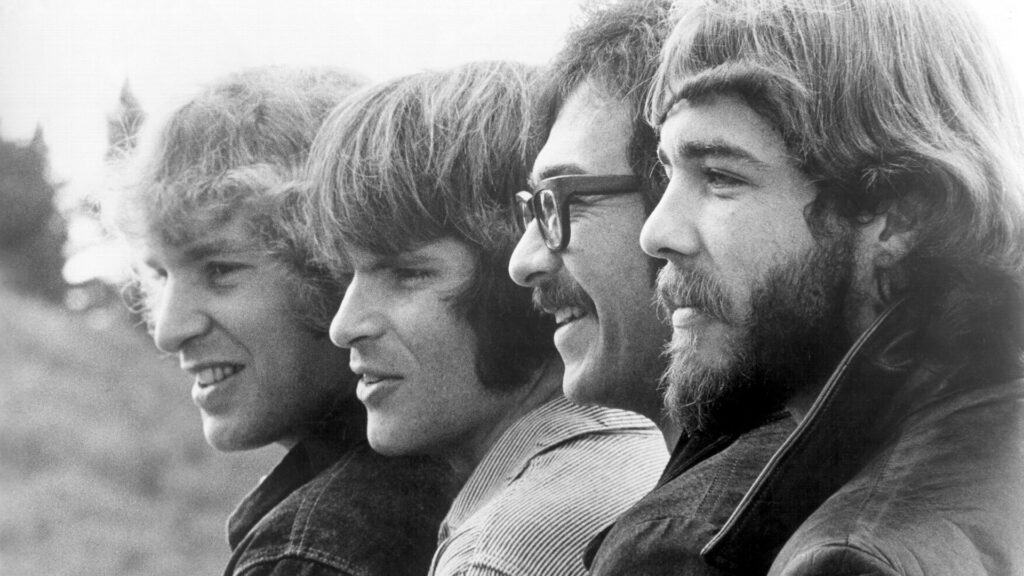
A lean, bluesy shiver—bad omens on the dashboard and a name you can’t outrun, set to a bar-band shuffle that keeps rolling even when the road goes dark.
Essentials up front. Song: “Tombstone Shadow.” Artist: Creedence Clearwater Revival. Album: Green River (Fantasy, released August 1969). Writer: John Fogerty. Placement/length: Side One, Track 3; 3:39. Recorded: March–June 1969 at Wally Heider Studios, San Francisco. Production: John Fogerty with Saul Zaentz; engineer: Russ Gary. Not issued as a U.S. single; a deep-cut that later reappeared on Chronicle, Vol. 2, and as a staple of CCR’s concert set (hear it on the 1980 live LP The Concert).
What gives “Tombstone Shadow” its staying power—especially to ears that grew up with the needle and the walnut console—isn’t mystery for mystery’s sake. It’s clarity: a tight 12-bar stomp that moves like a working band getting paid by the set, and a lyric that wears its dread like a jacket you can’t quite shrug off. Fogerty’s guitar snaps the verses into motion, Doug Clifford’s snare lands like a heartbeat, Stu Cook walks the bass just behind the kick, and Tom Fogerty’s rhythm chops the air so the whole thing breathes. Drop the needle and you’re in the room: dry, close, unfussy—the CCR sound at full bloom on the record that put them at No. 1 on the album chart.
There’s a true-life chill under the groove. Fogerty has said the song sprang from a stop with a fortune teller in San Bernardino—the “gypsy man ‘way down in San Berdoo” who warned him off airplanes and spun a line about “thirteen months” of trouble. The lyric lifts those fragments wholesale: “Fly in no machines… thirteen months of bad luck.” It’s classic CCR alchemy—turning a roadside anecdote into a chorus you can steer by when the night gets long.
On the LP, its position does some quiet storytelling. After the opening pair of radio-bright rockers—“Green River” and “Commotion”—this third track drops the lights a notch. The album pivots from daylight swagger to shadowed, blues-backed foreboding, setting up the reflective “Wrote a Song for Everyone” and the second-side run of hits. Sequencing like that is part of why Green River feels so complete: it’s not just a cache of singles, it’s a room with corners. The track list and timings bear it out right on the sleeve.
Listen for the discipline inside the spook. Fogerty doesn’t oversell; he sits right on the lyric, a shade ahead of the beat, so the phrases bite without bluster. The band refuses to rush. No studio perfume, no indulgent soloing—just phrases that answer and quit while they’re ahead. That economy is the old CCR promise: be simple and speak powerfully, and the song will do the haunting for you.
If you ever caught the band live—or spun the 1980 concert document—you know “Tombstone Shadow” wasn’t only an album mood piece; it was a set anchor, a mid-show gear that let the quartet lean into its blues bones without losing pace. On The Concert, the tune stretches a hair, gaining that rough stage edge while keeping its center of gravity. It’s proof the record wasn’t a studio trick; it was a working arrangement these four could carry into any hall.
For the archivist’s shelf: Side One, Track 3; 3:39 on most editions (Apple/streaming list the same); recorded March–June 1969 at Wally Heider; produced by John Fogerty with Saul Zaentz; engineered by Russ Gary. The album itself bowed in August 1969 and topped the Billboard 200; “Tombstone Shadow” stayed an album cut until compilations like Chronicle, Vol. 2 carried it forward for younger listeners. All those details line up neatly with the way the track feels: measured, lean, and meant to last.
And the meaning? In three and a half minutes, CCR catch a kind of grown-up superstition—not tarot-card theater, but that everyday sense that the other shoe is out there somewhere, already falling. The great trick is that they make it useful. This isn’t paralysis; it’s motion, with caution. The shuffle keeps you moving, the guitar answers keep you focused, and the chorus—tombstone shadow stretchin’ across my path—names the feeling so you don’t have to. Put it on tonight and the years compress: the dashboard light, the long stretch home, the reminder that trouble can ride along without taking the wheel. That’s why “Tombstone Shadow” endures. It’s not just a mood. It’s a map.